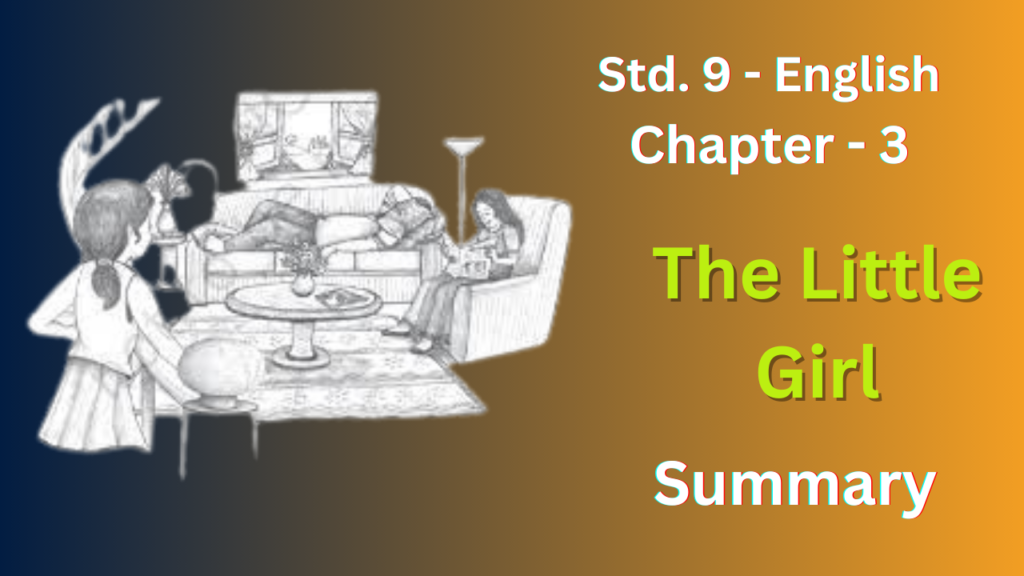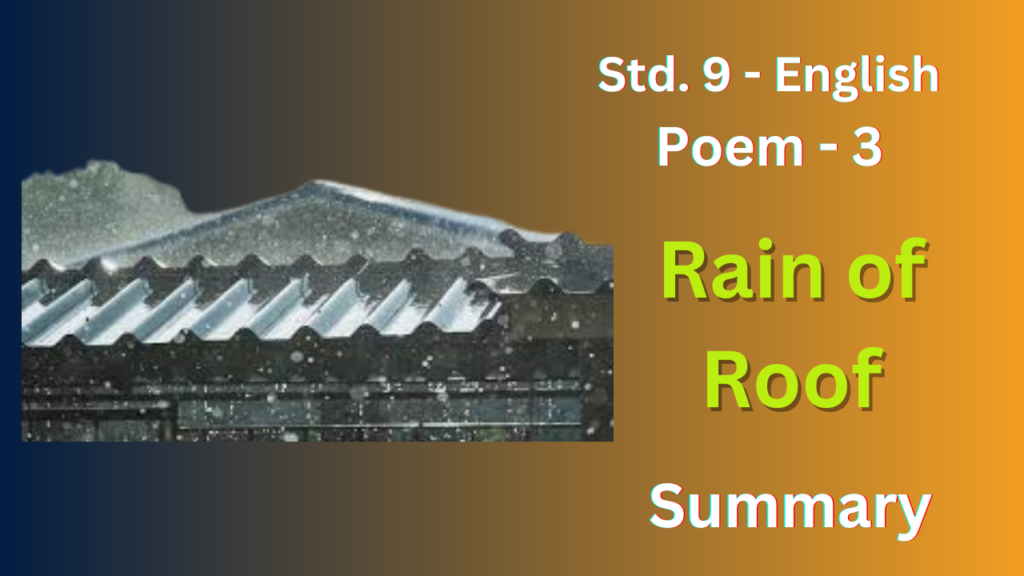NCERT Solutions for Class 9 English chapter 3
The Little Girl
The chapter “The Little Girl” by Katherine Mansfield tells the story of a young girl named Kezia and her strained relationship with her father. Here’s a summary:
- Fear and Distance: Kezia feels a sense of fear and intimidation towards her father. His large presence and strict demeanor make her nervous.
- Relief at Absence: She experiences relief whenever he leaves for work and dreads his return.
- Communication Gap: Attempts by Kezia’s grandmother to encourage interaction between Kezia and her parents prove unsuccessful.
- Misunderstanding: Kezia perceives her father as cold and unapproachable.
- A Gift of Love: When her grandmother suggests making a birthday present for her father, Kezia feels a surge of love and wants to please him.
- Uncertain Hope: The story ends with Kezia starting to work on a pincushion for her father, leaving a hint of hope for a potential improvement in their relationship.
Themes:
- Parent-Child Relationships: The story explores the complexities of a child’s perception of a strict parent.
- Fear and Misunderstanding: It highlights how fear and lack of communication can create distance within a family.
- The Power of Love: Despite her fear, Kezia’s desire to please her father suggests an underlying love that could bridge the gap.
Overall, “The Little Girl” is a poignant portrayal of a child’s struggle to connect with a seemingly distant parent.

NCERT Solutions for Class 9 English chapter 3
Thinking about the text
I. Given below are some emotions that Kezia felt. Match the emotions in Column A with the items in Column B.
| A | B |
| 1. fear or terror2. glad sense of relief3. a‘funny’ feeling, perhaps of understanding | (i) father comes into her room to give her a goodbye kiss(ii) noise of the carriage grows fainter(iii) father comes home(iv) speaking to father(v) going to bed when alone at home(vi) father comforts her and falls asleep(vii) father stretched out on the sofa, snoring |
Ans :
1. — (iii)
2. — (ii)
3. — (vi)
II. Answer the following questions in one or two sentences.
1. Why was Kezia afraid of her father?
Ans : Kezia’s fear stemmed from her father’s large stature, strict demeanor, and lack of communication, making him seem intimidating.
2. Who were the people in Kezia’s family?
Ans :
Herself: The young girl, the central character of the story.
Her Father: A large and seemingly strict figure who Kezia fears.
Her Mother: While not as prominent in the story, Kezia’s mother is likely present but not a central focus of Kezia’s anxieties.
Her Grandmother: A kind and understanding figure who tries to bridge the gap between Kezia and her father.
3. What was Kezia’s father’s routine?
- before going to his office?
- after coming back from his office?
- on Sundays?
Ans :
- Mornings: He leaves for work after giving Kezia a perfunctory kiss (possibly a goodbye kiss).
- Evenings: He returns home, and the sound of his arrival fills Kezia with dread.
- Sundays: While not explicitly mentioned, it’s implied that Sundays might be a time for rest, as Kezia describes him stretched out on the sofa, snoring.
4. In what ways did Kezia’s grandmother encourage her to get to know her father better?
Ans :
Sunday Drawing Room Visits: She suggested Kezia spend time talking with her parents in the drawing room on Sundays. This created a designated opportunity for interaction between Kezia and her father.
Birthday Gift Proposal: The grandmother proposed making a pincushion for Kezia’s father as a birthday present. This suggestion sparked a sense of purpose and love in Kezia, motivating her to do something kind for him.
III. Discuss these questions in class with your teacher and then write down your answers in two or three paragraphs each.
1. Kezia’s efforts to please her father resulted in displeasing him very much. How did this happen?
Ans :
- A Gift of Love: Driven by her grandmother’s suggestion and a newfound desire to connect with her father, Kezia embarked on making a pincushion as a birthday gift. This act stemmed from a genuine desire to please him.
- Material Mishap: In her eagerness and limited access to crafting materials, Kezia used torn pieces of paper, unknowingly her father’s important speech for the Port Authority, to fill the pincushion.
- Unintended Destruction and Fury: When her father discovered the destroyed speech, he became enraged, mistaking Kezia’s actions for carelessness or disobedience. This lack of understanding of her intentions led to a harsh punishment.
2. Kezia decides that there are “different kinds of fathers”. What kind of father was Mr Macdonald, and how was he different from Kezia’s father?
Ans :
Mr. Macdonald:
- Warm and Playful: The story describes him playing tag, wrestling playfully, and laughing with his children. This suggests a more approachable and fun-loving personality compared to Kezia’s strict father.
- Friendly: His children seem comfortable and friendly with him, a stark contrast to Kezia’s fear of her father.
- Forgiving: The story doesn’t mention him punishing his children, implying a more forgiving and understanding approach compared to Kezia’s father’s harsh punishment.
Kezia’s Father:
- Strict and Intimidating: Kezia perceives him as large, loud, and cold. His presence fills her with fear and dread.
- Distant: There seems to be a lack of communication and connection between Kezia and her father.
- Harsh: The story mentions Kezia being punished for destroying her father’s speech, suggesting a strict disciplinary approach.
In essence, Mr. Macdonald represents a more affectionate and playful father figure, while Kezia’s father embodies a strict and distant parental style. This comparison makes Kezia realize there can be different kinds of fathers, sparking a potential yearning for a closer relationship with her own.
3. How does Kezia begin to see her father as a human being who needs her sympathy?
Ans : One night, Kezia had a terrifying nightmare and cried out in fear. When she woke up, she found her father beside her bed, holding a candle. He asked her what was wrong, and upon hearing about her nightmare, he blew out the candle, bent down, and scooped her up in his arms. He carried her to the big bedroom, laid her on the bed, and tucked her in. Then, he lay down beside her.
Still half asleep, Kezia crept close to him, snuggled her head under his arm, and held tightly to his shirt. She now felt comfortable.
Her father told her to rub her feet against his legs to warm them.
At that moment, Kezia realized her father was not as harsh as she had thought. She understood that he had to work all day and was often too tired to play with her. She realized that he wanted her to understand his situation. Deep down, he was a very good person.
Thinking about language
I. Look at the following sentence.
There was a glad sense of relief when she heard the noise of the carriage growing fainter…
Here, glad means happy about something. Glad, happy, pleased, delighted, thrilled and overjoyed are synonyms (words or expressions that have the same or nearly the same meaning.) However, they express happiness in certain ways.
Read the sentences below:
- She was glad when the meeting was over.
- The chief guest was pleased to announce the name of the winner.
Question 1.
Use an appropriate word from the synonyms given above in the following sentences. Clues are given in brackets.
- She was ………. by the news of her brother’s wedding, (very pleased)
- I was ………. to be invited to the party. (extremely pleased and excited about)
- She was ………. at the birth of her granddaughter, (extremely happy)
- The coach was ……….. with his performance, (satisfied about)
- She was very …………. with her results. (happy about something that has happened)
Ans :
- She was overjoyed by the news of her brother’s wedding. (very pleased)
- I was thrilled to be invited to the party. (extremely pleased and excited about)
- She was elated at the birth of her granddaughter. (extremely happy)
- The coach was satisfied with his performance. (satisfied about)
- She was very pleased with her results. (happy about something that has happened)
2. Study the use of the word big in the following sentence:
He was so big—his hands and his
neck, especially his mouth…
Here, big means large in size.
Now, consult a dictionary and find out the meaning of big in the following sentences. The first one has been done for you.
- You are a big girl now. older
- Today you are going to take the biggest decision of your career …….
- Their project is full of big ideas …….
- Cricket is a big game in our country……..
- I am a big fan of Lata Mangeshkar……..
- You have to cook a bit more as my friend is a big eater ……..
- What a big heart you’ve got, Father dear ……..
Ans :
- most important
- great
- very popular
- great
- great
- very affectionate/large-hearted.
II. Verbs of Reporting
Study the following sentences.
- “What! ” screamed Mother.
- “N-n-no”, she whispered.
- “Sit up”, he ordered.
The italicised words are verbs of reporting. We quote or report what someone has said or thought by using a reporting verb. Every reporting clause contains a reporting verb. For example:
- He promised to help in my project.
- “How are you doing?” Seema asked. We use verbs of reporting to advise, order, report statements, thoughts, intentions, questions, requests, apologise, manner of speaking and so on.
Question 1.
Underline the verbs of reporting in the following sentences.
- He says he will enjoy the ride.
- Father mentioned that he was going on a holiday.
- No one told us that the shop was closed.
- He answered that the price would go up.
- I wondered why he was screaming,
- Ben told her to wake him up.
- Ratan apologised for coming late to the party.
Ans :
- He says he will enjoy the ride.
- Father mentioned that he was going on a holiday.
- No one told us that the shop was closed.
- He answered that the price would go up.
- I wondered why he was screaming.
- Ben told her to wake him up.
- Ratan apologised for coming late to the party.
2. Some verbs of reporting are given in the box. Choose the appropriate verbs and fill in the blanks in the following sentences:
| were complaining, shouted, replied, remarked, ordered, suggested |
- “I am not afraid” ………. , the woman.
- “Leave me alone,” my mother
- The children ……….. that the roads were crowded and noisy.
- “Perhaps he isn’t a bad sort of a chap after all” ……….., the master.
- “Let’s go and look at the school ground”……….., the sports teacher.
- The traffic police ……….. all the passers- by to keep off the road.
Ans :
- “I am not afraid,” replied the woman.
- “Leave me alone,” shouted my mother.
- The children were complaining that the roads were crowded and noisy.
- “Perhaps he isn’t a bad sort of a chap after all,” remarked the master.
- “Let’s go and look at the school ground,” suggested the sports teacher.
- The traffic police ordered all the passers-by to keep off the road.
Speaking
Form pairs or groups and discuss the following questions:
1. This story is not an Indian story. But do you think there are fathers, mothers and grandmothers like the ones portrayed in the story in our own country?
Ans : This story might not be Indian, but similar families likely exist there. Strict fathers, caring mothers, and understanding grandparents are found across cultures. While cultural influences exist, the complexities of parent-child relationships are universal. India, for instance, might see a connection with the strict father figure and the mediating role of the grandmother. Overall, the story’s core message about family and connection resonates beyond cultural specifics.
2. Was Kezia’s father right to punish her?
What kind of a person was he? You might find some of these words useful in describing him:
Ans :
Kezia’s father was wrong to punish her. He should have understood that she was only a child and children tend to make mistakes. A child’s mistakes should always be corrected gently.
On one hand, he was strict, unkind, and short-tempered. On the other hand, he was hardworking, responsible, and caring towards his family. He worked hard all day and was often too tired to spend time with Kezia. Despite this, he deeply cared for and loved her. When she was frightened by a nightmare, he immediately came to her with a candle to see what was wrong. This shows how much he cared for her.
Writing
Has your life been different from or similar to that of Kezia when you were a child? Has your perception about your parents changed now? Do you find any change in your parents ’ behaviour vis-a-vis yours? Who has become more understanding? What steps would you like to take to build a relationship based on understanding? Write three or four paragraphs (150-200 words) discussing these issues from your own experience.
Ans : Growing up, my experience was both similar to and different from Kezia’s. Like her, I sometimes felt misunderstood by my parents due to their strictness. However, my parents were more openly affectionate, which helped me feel their love despite occasional sternness.
As I matured, my perception of my parents changed significantly. I now understand that their strictness was a form of care and guidance. Recognizing the pressures they faced, I appreciate the sacrifices they made for our family.
I’ve also noticed that my parents have become more understanding and patient over time. This mutual understanding has strengthened our relationship, fostering a deeper connection based on respect and appreciation.
To build a relationship based on understanding, I prioritize open communication, active listening, and expressing gratitude. By valuing their perspective and acknowledging their efforts, I aim to maintain a strong, empathetic relationship with my parents.
Class 9 english chapter 3
Rain of Roof
The poem “Rain on the Roof” by Coates Kinney describes the speaker’s peaceful and nostalgic feelings as they listen to the sound of rain falling on the roof.
Key elements:
- Setting: The poem takes place at night, inside a cottage or a house with a roof.
- Sound: The central image is the pitter-patter of raindrops hitting the roof.
- Memories: The sound triggers a flood of warm memories for the speaker, likely from their childhood.
- Imagery: The poem uses words to evoke a sense of comfort and security associated with the rain and the memories.
- Motherly figure: There’s a gentle, nurturing presence associated with the memories, possibly the speaker’s mother.
Possible Interpretations:
- Comfort and Security: The rain symbolizes a sense of peace and safety, a feeling often associated with childhood and home.
- Power of Memory: The sound acts as a trigger for happy memories from the past, offering a sense of comfort in the present.
- Loss and Longing: There might be a subtle hint of loss or longing associated with the memories, especially if the motherly figure is no longer present.

NCERT Solutions for Class 9 English chapter 3
Thinking about the poem
I
What do the following phrases mean to you? Discuss in class.
- humid shadows
- starry spheres
- what a bliss
- a thousand dreamy fancies into busy being start
- a thousand recollections weave their air-threads into woof
Ans :
- humid shadows: Dark shapes cast by objects due to a damp atmosphere.
- starry spheres: The vast expanse of the night sky filled with stars.
- what a bliss: An exclamation of intense happiness or contentment.
- a thousand dreamy fancies into busy being start: This means the speaker’s mind is filled with countless daydreams and imaginative thoughts, which are then replaced by the realities of daily life (“busy being”).
- a thousand recollections weave their air-threads into woof: This describes a multitude of memories being woven together to create a whole picture. “Air-threads” suggests the memories are intangible or fleeting, while “woof” refers to the weft in weaving, the foundation of the tapestry of memories.
2. What does the poet like to do when it rains?
Ans : The poem doesn’t say what the speaker does, but suggests they enjoy listening to the rain, reflecting on memories, and finding comfort in the experience.
3. What is the single major memory that comes to the poet’s mind? Who are the “darling dreamers” he refers to?
Ans : The single major memory that comes to the poet’s mind in “Rain on the Roof” is of his mother.
The “darling dreamers” are most likely the poet and his siblings as children. They are referred to as “darling” to show the mother’s love and care for them.
4. Is the poet now a child? Is his mother still alive?
Ans : The poet isn’t a child now. “Years agone” suggests the memories are from the past. The poem focuses on the emotions, not the mother’s current status.
II
1. When you were a young child, did your mother tuck you in, as the poet’s mother did?
Ans : Yes, my mother used to tuck me in when I was a child. Whenever I said I couldn’t do something, she would embrace me and take me in her lap to help me complete the task. She felt sad and dejected whenever I was involved in any mishap.
2. Do you like rain? What do you do when it rains steadily or heavily as described in the poem?
Ans : Yes, I like rain and enjoy taking a bath in it for a while. However, when it rains heavily, I prefer to stay inside and appreciate the beauty of nature.
3. Does everybody have a cosy bed to lie in when it rains? Look around you and describe how different kinds of people or animals spend time, seek shelter, etc. during rain.
Ans : Rain impacts everyone differently, and how we experience it depends on factors like location, resources, and even species
Humans:
- Cozy Comfort: For many, rain is a time to curl up in a warm bed with a good book, enjoying the pitter-patter on the roof.
- Seeking Shelter: People caught outdoors might run for bus stops, building overhangs, or any available refuge from the downpour.
- Embrace the Wet: Some people love splashing in puddles or taking walks in the rain, finding joy in the feeling of cool water.
- Not So Lucky: Unfortunately, homeless individuals or those living in inadequate shelter might face harsh realities during heavy rain.
Animals:
- Birds: They might seek refuge in trees or under eaves, fluffing their feathers for warmth and waterproofing.
- Mammals: Animals with fur might find shelter in caves, burrows, or under dense foliage.
- Insects: Some insects take cover under leaves or within flowers, while others might simply ride out the rain by clinging to surfaces.
- Amphibians: Frogs and toads often welcome rain, as it creates breeding pools and moist environments they thrive in.
Nature Itself:
- Plants: Rain provides life-giving water for plants, promoting growth and replenishing the soil.
- Earth: The dry earth soaks up the rain, replenishing groundwater reserves and preventing drought.
- Rivers and Streams: Heavy rain can lead to overflowing rivers and streams, impacting landscapes and ecosystems.
NCERT Solutions for Class 9 English chapter 3
FAQ’s
What is covered in NCERT Solutions for Class 9 English Chapter 3?
The NCERT Solutions for Class 9 English Chapter 3 include detailed explanations, summaries, and answers to all the questions in the textbook, helping students understand the chapter thoroughly.
How can NCERT Solutions for Class 9 English Chapter 3 help me in my studies?
These solutions provide clear and comprehensive explanations of the chapter, helping you grasp the concepts better and prepare effectively for exams.
Are the NCERT Solutions for Class 9 English Chapter 3 reliable?
Yes, the solutions are prepared by experts and are reliable, accurate, and aligned with the latest NCERT guidelines.
Where can I find NCERT Solutions for Class 9 English Chapter 3?
You can find these solutions on educational websites, NCERT’s official site, and various online study platforms.
What are the key benefits of using NCERT Solutions for Class 9 English Chapter 3?
The key benefits include a deeper understanding of the chapter, improved analytical skills, and better preparation for exams.


